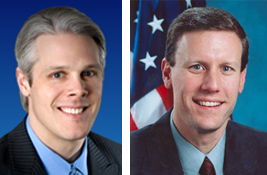A musician who’s a political outsider and a three-term incumbent.
Those are voters’ choices in the 49th state Senate District in November.
The incumbent is state Sen. David Valesky, D-Oneida. He is being challenged by Republican Andrew Russo, a concert pianist and newcomer to politics. Russo won the GOP primary on Sept. 14 against Danny Liedka, the mayor of East Syracuse. Russo had 6,674 votes to 3,456 for Liedka. He also raised about $200,000 for his campaign while Liedka trailed with $55,702. For the Democrats, Valesky had no primary opponent.
The general election is Nov. 2.
In the primary, novice Russo’s victory over an experienced elected official captures some of the frustration among voters toward politics-as-usual, said political scientist Jeffrey Stonecash of Syracuse University. “There is a lot of hostility about incumbents. There is a lot of resentment and lack of understanding about the state legislature so lots of people want some change,” said Stonecash.
The 49th state Senate District includes Madison County and parts of Cayuga, Onondaga and Oneida Counties. Valesky has held the seat since 2004, when he defeated Republican Nancy Larraine Hoffman, who was first elected to the New York State Senate in 1984.
The 49th Senate District is a key battleground for control of the state senate. Republicans lost the legislature’s majority in 2008. Now, they hold 30 seats to 32 for the Democrats in the state senate.
On April 1, the 49th Senate District had a total of 364,288 voters. Of those, 135,776 or 37.3 percent were Democrats; 118,844 or 32.7 percent Republicans; 23,332 or 6.4 percent Conservatives; and 17,418 or 4.8 percent Independence Party. Another 83,370 or 23 percent were unaffiliated with a party.
Here are sketches of the candidates:
David Valesky (incumbent, Democrat)
David Valesky, 44, was born in Oneida. He holds a bachelor’s degree in mathematics from the State University of New York at Postdam and a master’s degree in political science from the University of Connecticut.
Valesky and his campaign did not respond to three interview requests.
His parents and wife are public school teachers. He has had support from the state’s teachers’ unions but has lost that by voting for $1.4 billion in cuts to the education budget.
Valesky is vice president pro tempore of the Senate. He serves as an ex-officio member on every Standing Committee in the New York State Senate. He is also a member of the standing Committee on Finance; Rules; Transportation; Agriculture; Energy and Telecommunications; Health; Local Government; and Cultural Affairs and Tourism. He also serves as the chair of the Senate’s Temporary Committee on Rules and Administration Reform.
In 2004, he ran on a platform of reforming the legislature. Now, he is vulnerable in the anti-incumbent mood among voters, says Kristi Andersen, a political scientist at Syracuse University. The main argument that could be used against him is the absence of reform in the legislature by the Democrats while Valesky portrays himself as a reformer, said Andersen.
“Valesky doesn’t always do a good job of explaining how he is both a member of this party and a reformer,” she said in an interview.
Andrew Russo (challenger, Republican)
Andrew Russo of Fayetteville is a concert pianist who has never run for public office. In December 2009, The Post-Standard reported he also had not voted between 2001 and 2008. Russo attributed his absence from politics, even by voting, to spending much of his time out of the country on concert tours.
In his musical career, Russo spent about ten years in Europe. Five years ago, he came back to his native Syracuse and, he has said, decided to get involved in his community. He lists his political priorities as lowering taxes and cutting government spending.
“The government needs to be small, to spend less money and leave the money in the pockets of the people who live in the community. That will allow people to start businesses, which would create more jobs,” Russo said in an interview.
He does not plan to make a career of politics, Russo said. He supports limiting elected officials’ terms to eight years. “Eight years is long enough to make a difference, to change the system without having the system change you,” he said.
Russo could benefit from voters’ disillusionment with incumbents, suggested political scientist Andersen. “At a time when people’s estimate of politicians, and particularly the New York state legislature, is very low, there is an extent to which he may be able to make that an advantage,” she said.
(Marie Claudet is a broadcast and digital journalism graduate student.)
-30-



